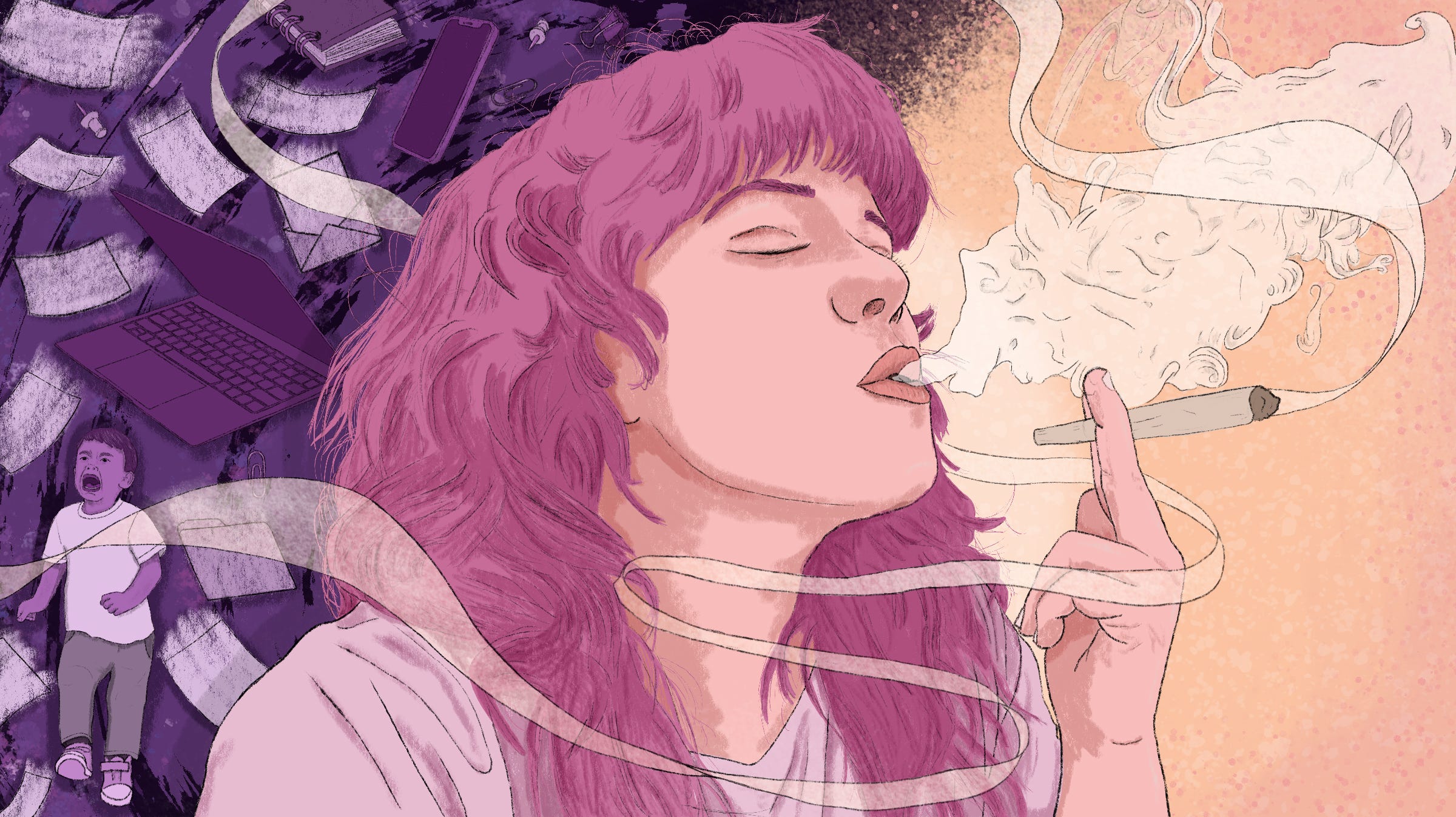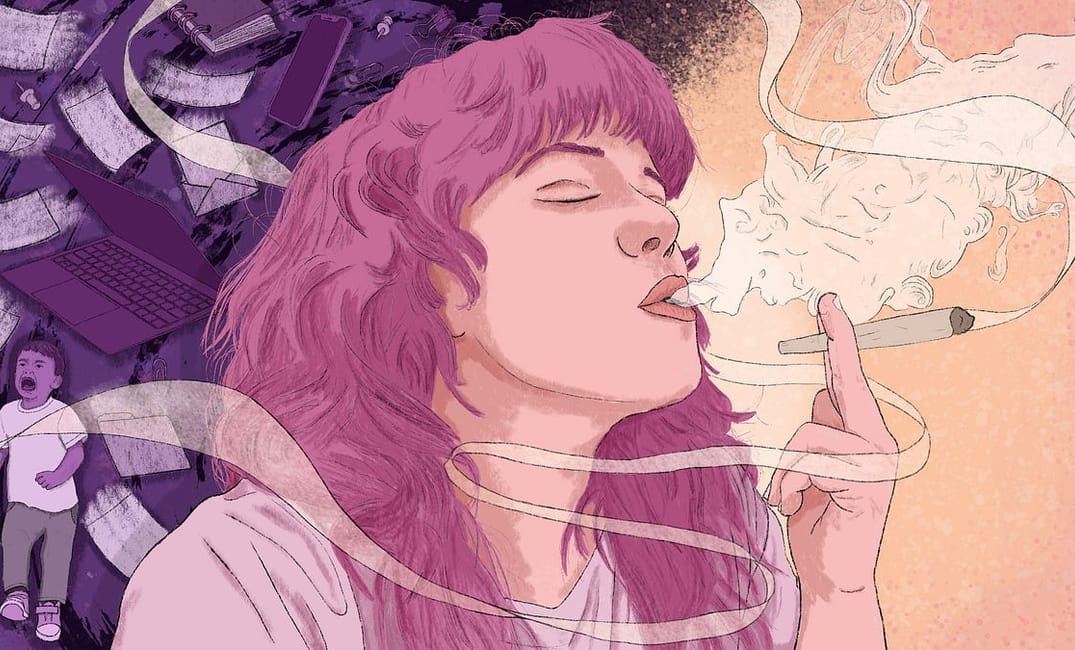
After indulging in my default stress-busters in the early months of the pandemic, I realized they weren’t making me feel better. So one Friday afternoon this past summer—after a long week of tag-teaming childcare and working from home—my husband and I opted for Kiva gummies instead of cocktails.
I only had a minimal amount (half of a single-dose gummy), but a beautiful thing happened. My stress headache lifted. I felt my shoulders relax. I turned up the music and danced with my three-year-old son. My mind became more present with my family. But best of all, I still felt like myself — just less overwhelmed.
Eventually, this became more of a routine. My husband and I officially found a new way to glide from a work mindset to a weekend one.
Sign up for The Bold Italic newsletter to get the best of the Bay Area in your inbox every week.
I realize that taking a weed gummy isn’t a mind-blowing development. After all, the image of a haggard mom popping open a bottle of wine at “wine o’clock” has been waning for a while. Cannabis products — both CBD and THC — have been replacing alcohol as people have gained legal access (although, obviously, this has been illegally happening for years).
In 2020, with marijuana legal in more places than ever and stress levels higher than ever, weed sales are hitting record points. Retail sales of cannabis in the U.S. are set to eclipse $15 billion by the end of the year, an increase of roughly 40% over 2019.
A target demographic for growth: overworked and overwhelmed moms who need to chill out.
I’ve seen rows of smartly marketed edibles, tinctures, teas, you name it, all begging to fit into the booming self-care industry. And it’s working, with many women using weed to help them with the supremely challenging task of parenting through a pandemic. With surveys showing that more emotional labor and stress falls on moms than dads, especially in low-income and multiple-child families, it makes sense.
However, there’s still a stigma around weed and mothering. While downing a bottle of wine is socially acceptable, a mom smoking a joint is still not a good look to most. After all, for so long, marijuana was an illegal substance, and historically, especially in the Black community, possessing it has been a reason government agencies have separated moms from children. In some parts of the country, this is still the case.
The stigma is slowly changing. For this story, I reflected on my own years of taking small amounts of weed. I also spoke with five other Bay Area women who, like me, have found cannabis to help manage arguably the most collectively upending year in our lives. These women use cannabis for a range of issues, including anxiety, insomnia, pain, and post-traumatic stress disorder. Often, they microdose, meaning they take a very small amount — just enough to take the edge off.
Ozzie Ozkay-Villa, a mother of two in Marin who has long dabbled in cannabis, has found it especially helpful to turn to edibles or tinctures this year to calm her busy mind and focus. “During these difficult times, I’m grateful to have a natural alternative to pharmaceuticals to help me deal with daily, sometimes debilitating anxiety, panic, and fear,” said Ozkay-Villa, who is also a doula and the founder of Oov Lifestyle, a cannabis community for women.
Another benefit she mentions: skipping “the hangover headache.”
I can relate to that. Being hungover with a three-year-old blows.
Ozkay-Villa says that the overall vibe of her home becomes more positive, and she and her husband connect on a deeper level. “Cannabis helps me stay present with my kids, which can be challenging as a busy mom with so much to do,” Ozkay-Villa continues. “Instead of thinking about what needs to get done, I’m able to melt into being completely there for them in a more patient and relaxed way.”
Ali Lawrence, a writer, editor, and mom to two kids in Oakland, agrees. She sees cannabis as a tool to help her get out of “monkey mind” and into the present moment. “On stressful days when transitioning from being a mama into working woman back into mama mode, I find that either THC or CBD can help ground me, be more focused with my kids, and be less stressed about work and my other responsibilities,” Lawrence says.
While some of the women took small amounts of cannabis while around their kids, others waited until their kids were asleep.
Ozkay-Villa disagrees with people who compare cannabis and alcohol use. “I find that cannabis actually helps me interpret and process the day, almost like self-therapy. Instead of escaping, it helps me work through it,” she says.
For Lawrence, finding an edible with the right ratio of CBD to THC was key — she takes a Plus 18 THC:1 CBD gummy during her kids’ bedtime routine that helps her ease into her own bedtime routine and sleep better.
Gina Golden, a mother of one and maker of Golden Goddess Botanicals, started taking long walks with her dog before bed “as a meditation” when Covid-19 hit, taking a puff before she headed out. She also uses a suppository that she makes. “When I want a restful sleep with powerful dreams, I infuse the suppository with whole THC and CBD flower. I have very lucid dreams and wake up feeling fantastic,” Golden says.
Many of the same marginalized groups that the war on drugs affected are now being the hardest hit by the pandemic — namely, Black women. Charlita Brown, a single mom and the owner of Oakland delivery concierge Euphorium, says this year has been catastrophic for Black moms especially.
Their fears have flared up, from protecting their children from Covid-19, fearing another term for Donald Trump, racial injustice, and waking up to an orange sky. Brown can’t shake the emotion of one mom she spoke with when Covid-19 took over in March who was hysterically crying on the phone.
“When you peel the layers back, it’s so much to be stressed about,” says Brown.
Brown’s customers who can’t afford childcare and “are stressed the fuck out from homeschooling” have turned to cannabis for help with anxiety, sleep, and finding some mental space.
It’s important to recognize the privilege of white women like me who are now dabbling in weed for fun when racist laws and police practice around marijuana has historically caused irreparable damage to families, especially Black families, across the country. Black families are more susceptible to legal intervention, even in decriminalized states. The policies vary from state to state, but if a blood test reveals marijuana in a mother who has just delivered, the repercussions could range from arrest to the child being taken away.
It’s for that reason, paired with a lack of public education and research, that the taboo around cannabis and mothering remain. One especially fraught topic: using weed during pregnancy and breastfeeding, two very stressful periods of a woman’s life. Because there has been so little research on the effects of marijuana use by a mother on her baby, nearly all doctors universally recommend avoiding it. Emily Oster, author of data-driven parenting books Expecting Better and Cribsheet, sums up the most recent Canadian study from 2019 with more than 600,000 women in Ontario urging “caution” for use during pregnancy.
A 2019 survey of 700 moms by cannabis educator and retailer Miss Grass revealed the main uses of cannabis during pregnancy are reducing nausea and stress, yet 51% of the moms hid their consumption from professional contacts.
Of the mamas interviewed, Golden was the only one who said she used cannabis while pregnant. “I used very small amounts of THC once a day before swimming, for relaxation,” she said. “I also mixed raw flower into my pregnancy teas. I used a cannabis tincture during labor to help with the pain.” Golden says she was in a high-stress situation with her newlywed husband during her pregnancy and felt that being less anxious was the most important thing for her growing baby. Again, doctors recommend against this, and you should consult your own physician before making a personal decision.
While most medical professionals agree to avoid marijuana use while pregnant, postpartum and breastfeeding — periods when anxiety and depression can hit women hard — is a different story. I know this personally.
After the first five months with my son, I developed debilitating postpartum anxiety. In a desperate attempt to get myself together, I started taking an anti-anxiety medicine my doctor assured me was safe for breastfeeding. He said that such a small amount would get to my son through my milk that it is deemed safe. Within a day, I felt more like myself, but my already waning libido had vanished, and I was uncomfortable taking something unnatural while I was still breastfeeding. A friend told me about a friend of hers who was taking CBD for postpartum anxiety, and in a flash, I was off to Harborside in Oakland to get my new medicine.
After taking CBD for a few weeks (three to four weeks is recommended for efficacy), I weaned off the anti-anxiety drug. That was a mother’s intuition turning point for me, but I did need the Band-aid of the anti-anxiety medication to get there.
I made my decision based on my own research. Sources from the medical field seem to always recommend not consuming cannabis during breastfeeding. And then pro-cannabis sources reveal the other side of the coin. It all comes down to the need for more research and what you’re comfortable with personally.
Like any medicine, finding the right dosage and type can take some trial and error. But with the support system of other moms, we can find guidance. And the more we talk about it, the more we will learn and the more normalized it will become.
“I’d like to see a revision of the policies around mothers who consume cannabis,” said Golden. “I believe that mild use can make us better parents with more creativity and patience to offer our kids. It’s frightening that this medicine can be used as a reason to separate mothers from their children. It also feels sexist since we often give up so much of our physical autonomy to become mothers in the first place.”
Being a mom or any parent in 2020 has been next-level survival mode. If it’s acceptable to turn to pharmaceuticals or alcohol to get by, I feel okay with my decision to opt for half a gummy made from a plant instead.







